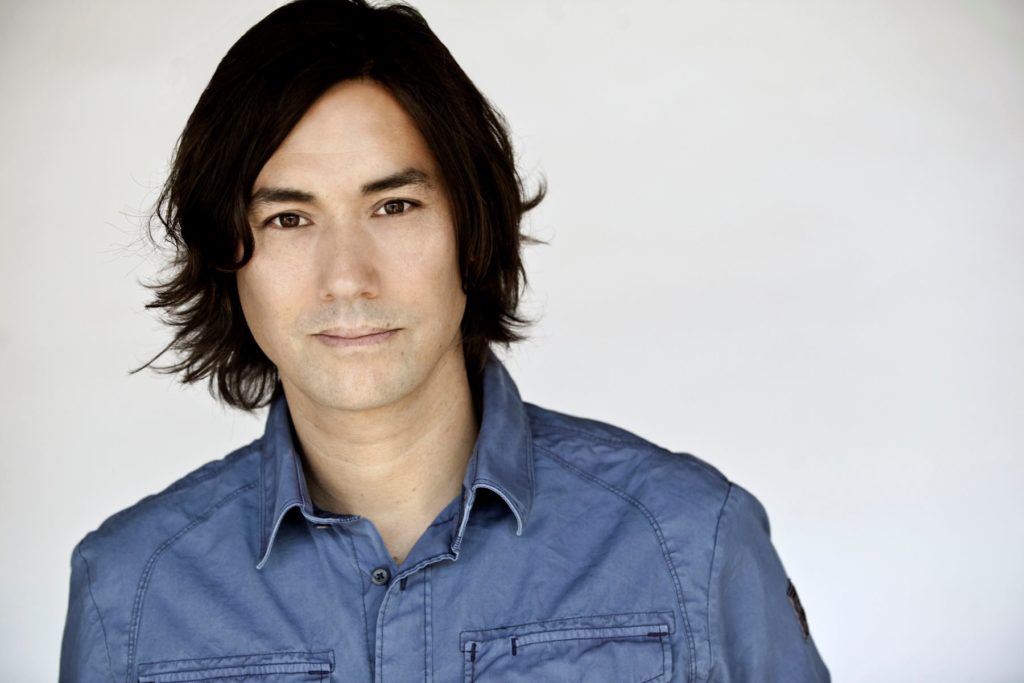
David Usher has spent many years proving that creative thought can be a powerful vehicle for a life without limits or boundaries to expression and innovation. Breaking free from the surly bonds of his most recognizable role as the frontman for the Canadian alternative rock group Moist, Usher first carved a reputation as a solo singer/songwriter of unique musical élan and acclaim throughout the first decade of the new millennium.
At the same time, he also embarked on what he himself has called an exploration “of art, technology and data” with the development of a partnership with Montreal’s Concordia University called the Human Impact Lab, as well as working as an expert speaker, project leader and consultant on creativity and innovation for the likes of Cirque de Soleil, the Royal Bank of Canada and other diverse entities.
But, his first love has always been music. Seeking a way to challenge himself and bring forth music in a new and unique manner, Usher’s latest album, Let it Play, sees him taking what some might see as a risk, but which he sees as more of an adventure. The album has him not just covering, but re-interpreting popular songs by French-Canadian recording artists, and singing them in English over the original musical bed tracks.
“My point wasn’t to re-record the songs like a traditional cover album. What I wanted to do was do it with the artist, so in many cases the artists are singing background vocals with me. And it’s their original tracks; I wanted to do it as they did it. It wasn’t to appropriate the song and do a whole new version, it was to do this actually weird mix of things, and that to me is what was interesting. It was that strange mix that makes in unique,” he said, explaining why he didn’t do a word-for-word translation of the French-language lyrics.
“It’s the language which is the definer in the music itself. They are huge songs by huge artists here, They’re as big or bigger than any of the English artists here in Quebec, and based on record sales they’re probably bigger. But the language is the definer and they’re almost unknown outside of the French-speaking word, and that’s where the experiment came in. Because the language itself was such a definer, that’s what I wanted to go and play with.
“No song on the album is a direct translation. I don’t believe you can do a translation of lyrics; you can only do an adaptation. So in some cases I would pull just the sentiments and in some cases maybe I would lean on a word here or there and in some cases I go off-message completely and the message is totally changed. It really depended on the song. I gave myself the freedom within this experiment to do all kinds of different things, and the artists were all cool with that.”
At the time the idea first came to Usher, he was not thinking of releasing a solo album, as his other work was keeping him quite busy. Once the notion of his creative re-imagining of French-Canadian hit songs sprung up, he simply tested the waters by approaching some of the artists directly for their thoughts.
“I talked to all my French-Canadian friends first and got the vibe of what people thought of the idea, because I wasn’t really sure how it would be received. But I got really positive feedback; everybody really liked the experimentation. Many of them said they were surprised that it hadn’t happened before. It was always happening in the other direction, from English to French, but very rarely are French songs ever translated into English. And then what I was proposing was even more of an experiment than that,” Usher said.
“You know, I have always been someone who believes that ideas come up for a reason, and I sort of travel with them in my head for a bit and see how they stick. A spark sits in your brain for a little while and if it continues to linger you start to explore it and as you explore it, it starts to grow. That’s the nature of every project I go into.
“I talked to my friends and they were all saying that is sounded interesting. So I found a song I wanted to try and I simply called the artist and said, ‘what do you think of this?’ And they were really into it. And from there I did the same with the next song and the next one. And this was all before it became sort of official. As I rolled through the process at some point I just said, ‘okay, we’re doing this.’”
The process of re-interpretation and recording was completed fairly quickly, but working on the legal logistics and securing what are known as the ‘mechanical’ rights to the original musical tracks took much longer. From start to finish, Usher said it was a year-long adventure from inception and release of Let It Play.
“The actual re-writing of the songs and the lyrics themselves – that for me was the easy part. There already was a great melody and great musical tracks, so the recording process was good. I am super-fast in the studio and I have great people I work with and trust implicitly with [co-producers] Fred St-Gelais and Luc Tellier, so that was really fun and fast. We discovered the hardest part was the actual rights side. There are so many rights holders on everything, so there was a lot of stuff to go through on the legal side.”
 And to make the process even a little more complicated, Usher chose to create his own record label on which to release Let It Play, Evil Empire.
And to make the process even a little more complicated, Usher chose to create his own record label on which to release Let It Play, Evil Empire.
As for the songs themselves, Usher has chosen some of the top Quebecois artists to cover, some of which were already friends, some of which have become friends during the process. These include Alex Nevsky, Monogrenade, Dumas, Ingrid St-Pierre, Baden Baden, Karim Ouellet, Daniel Lavoie and Caracol.
Usher felt that he too should take the same creative risk as the artists he is covering, so allowed one of his own songs to be translated and re-interpreted.
“I haven’t actually found any cultural negativity and I think part of the reason is because I really have gone a long way to make sure that the artists are actually happy. And the other thing is because I put my own song, Black Black Heart, through the same process where my friends essentially did an adaptation of the song and then me and Marie-Mai sang it in French. I am not putting anyone through a process that I am not willing to put myself through and I think that balance really helps to make things okay,” he said.
“The album lives on many different levels. I would love it if these songs led people back to the original artists, because they really do have amazing songs, beautiful songs. But I understand that the language makes it hard, it makes it hard for me as well. And then on another level, for my own personal reasons, I follow the thread and on another level I am always looking for something that feels like the process will feel new to me, that it will be a process that I haven’t encountered before and that there will be challenges that I didn’t expect. That was really important to me, and is important to me in all the work that I do.”
Usher has seemingly always loved to challenge his intellect and use it to drive unique creative business ventures. He developed a company called Cloudid Creativity Labs where brings together artists, designers and computer programming experts to work on a number of projects with applications across a broad spectrum of business and organizational models. That has morphed into the Human Impact Lab at Concordia University.

“Music is something that I love, but it’s really just one part of my life. It’s one of the things that I love to do. We’re living in a day and age where creativity and innovation are really the things that people are looking for and the value of that is really starting to come to light. When I first started talking to companies about creativity and innovation and embedding creativity into an existing hierarchy, those weren’t new ideas but the way of incorporating them into traditional business models was new. Now the conversation is not should I be doing this but how should I be doing this as a business owner. It’s no longer a question of do I need to be more creative, do I need to be more innovative. It’s more about how do I be more creative, how do I be more innovative and how do I do it right now,” he explained.
“This is something that’s important for everybody because we’re all living in this weird world of transition. Everybody in any job has to be creative now, has to be innovative now, because the job that you have today may well not be the job you have tomorrow. And it’s not just the newspaper business or the music business, it’s the banking business and the legal business – it’s across the board. And the changes that we’re experiencing now are just a tiny fraction of the change that’s coming down the pipe.”
One key point that Usher was at pains to emphasizes that creativity and innovation inherently means that there are successes and failures, but that it’s important to see a failed idea as still having value, whether it’s in creating music or a business venture.
“Your successes and your failures are all part of this interesting, twisted journey that you take. And it’s not just you, but everybody. The key is not always looking at the end result, because part of the creative process is continually doing analysis on your process and that means that every time you have a setback, it’s doing an analysis on that setback so you can learn and grow and challenge yourself and do it better the next time,” he said.
“With me, for every creative process that comes out in public, whether it be a success or a failure, it’s one of many creative projects that I am working on; many of these never see the light of day. They could be seen as failures but to me they are really just stepping stones in a bigger process. The important thing is that I have created a creativity template and way or working that I can apply to any sort of project. Creativity as a methodology lives separate from genre or separate from vertical. If you can really pull that creativity away from the genre then you can use that creative thinking methodology on all kinds of things. The palate of the world is open to you because you have this way or working that you can use and impose on any sort of process to create, to build and to launch.
“Creativity lies far beyond the artist. That’s one of the first things I talk about when I do public speaking is that creativity lives in all sorts of genres and media. It’s cross-platform. It lives in conversation, it lives in negotiation. Those are platforms that use creative thinking methodology.”
One methodology for which Usher has definitely mastered is live performance. He will be taking his show on the road in the New Year, playing a selection of songs from Let It Play as well as from both his solo catalogue and some Moist hits.
For more information, visit www.davidusher.com.
- Jim Barber is a veteran award-winning journalist and author based in Napanee, ON, who has been writing about music and musicians for a quarter of a century. Besides his journalistic endeavours, he now works as a communications and marketing specialist. Contact him at jimbarberwritingservices@gmail.com.
SHARE THIS POST:
